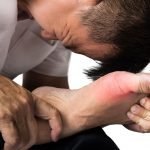Recent study questions knee replacement; is it worth it?
Node Smith, ND
A recent article from Kaiser Permanente questions the number of knee, and other joint replacements that are done yearly. Rates of knee surgery have doubled between 1999 and 2008, and are projected to reach 3.5 million per year by 2030. Currently, just under a million are performed each year.
Rates of knee surgery doubled between 1999 and 2008
Though many individuals experience symptomatic relief from knee replacement surgery, many do not. And physicians are becoming increasingly concerned that the procedure is being overused and that its benefits overstated.
Research reflects up to a third of individuals undergoing knee replacement still have chronic pain
Research suggests that as much as a third of individuals undergoing knee replacement continue to experience chronic pain,1 and a study last year from the BMJ concluded that knee replacement largely shows “minimal effects on quality of life.”2 These less than ideal outcomes are even more prevalent in those who have less severe arthritis.
A third of those getting knee replacement surgery may not even be appropriate candidates for surgery
The article points out that a third of people getting knee replacement surgery may not even be appropriate candidates for the procedure because their symptoms aren’t bad enough to warrant an aggressive intervention.
“We do too many knee replacements,” said Dr. James Rickert, president of the Society for Patient Centered Orthopedics, who advocates, in an interview, for affordable health care. “People will argue about the exact amount. But hardly anyone would argue that we don’t do too many.”
Age and weight co-factor in arthritic changes, which may lead to needing joint replacement
Individuals are aging and getting heavier, which are factors in arthritic changes that could lead to needing joint replacement. However, these factors alone don’t account for such increases and it is thought that doctor’s willingness to operate on younger people – in their 50’s and 60’s – likely account for the rise. This shift has occurred due to the increase in longevity of implant material.
Many who received implants earlier in life now require “revision” surgery
Even with the longer lasting implant material, many who have received implants at younger ages are requiring second “revision” surgeries to repair previous knee replacements. These second surgeries carry added burden as well as increased risk of complications. The bottom line is that younger patients are simply more likely to “outlive” the implant, requiring a second surgery. It is estimated that about 35 percent of men need a revision surgery if they are younger than 60 at the time of the first surgery; 20 percent for women.
Hospitals and surgery centers market knee replacements heavily
Yet, hospitals and surgery centers market knee replacements heavily, with ads that show patients running, bicycling, even playing basketball after the procedure, said Dr. Nicholas DiNubile, a Havertown, Pa., orthopedic surgeon specializing in sports medicine. While many people with artificial knees can return to moderate exercise — such as doubles tennis — it’s unrealistic to imagine them playing full-court basketball again, he said.
Kaiser notes other effective ways for treating arthritis aside from surgery
The article by Kaiser was adamant in stating that there are other effective ways of treating arthritis aside from surgery. Even more severe forms of arthritis have been well documented to be relieved by non-surgical interventions.
Source:
1. Riddle DL, Jiranek WA, Hayes CW. Use of a validated algorithm to judge the appropriateness of total knee arthroplasty in the United States: a multicenter longitudinal cohort study. Arthritis Rheumatol. 2014;66(8):2134-43.
2. Ferket BS, Feldman Z, Zhou J, Oei EH, Bierma-zeinstra SM, Mazumdar M. Impact of total knee replacement practice: cost effectiveness analysis of data from the Osteoarthritis Initiative. BMJ. 2017;356:j1131.
 Node Smith, ND, is a naturopathic physician in Portland, OR and associate editor for NDNR. He has been instrumental in maintaining a firm connection to the philosophy and heritage of naturopathic medicine among the next generation of docs. He helped found the first multi-generational experiential retreat, which brings elders, alumni, and students together for a weekend camp-out where naturopathic medicine and medical philosophy are experienced in nature. Four years ago he helped found the non-profit, Association for Naturopathic ReVitalization (ANR), for which he serves as the board chairman. ANR has a mission to inspire health practitioners to embody the naturopathic principles through experiential education. Node also has a firm belief that the next era of naturopathic medicine will see a resurgence of in-patient facilities which use fasting, earthing, hydrotherapy and homeopathy to bring people back from chronic diseases of modern living; he is involved in numerous conversations and projects to bring about this vision.
Node Smith, ND, is a naturopathic physician in Portland, OR and associate editor for NDNR. He has been instrumental in maintaining a firm connection to the philosophy and heritage of naturopathic medicine among the next generation of docs. He helped found the first multi-generational experiential retreat, which brings elders, alumni, and students together for a weekend camp-out where naturopathic medicine and medical philosophy are experienced in nature. Four years ago he helped found the non-profit, Association for Naturopathic ReVitalization (ANR), for which he serves as the board chairman. ANR has a mission to inspire health practitioners to embody the naturopathic principles through experiential education. Node also has a firm belief that the next era of naturopathic medicine will see a resurgence of in-patient facilities which use fasting, earthing, hydrotherapy and homeopathy to bring people back from chronic diseases of modern living; he is involved in numerous conversations and projects to bring about this vision.










